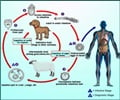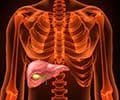- Bidwell JL, Pachner RW. Hemoptysis: Diagnosis and Management. Am Fam Physician. 2005 Oct 1;72(7):1253-1260.
- Hemoptysis - (http://www.merckmanuals.com/professional/pulmonary_disorders/symptoms_of_pulmonary_disorders/hemoptysis.html)
About
Hemoptysis is a condition where the patient spits out blood from the lungs or the bronchi while coughing. The condition requires immediate evaluation and treatment.
Hemoptysis is classified as:
- Massive hemoptysis, where the patient coughs up more than 200ml of blood per day
- Non-massive hemoptysis, where the patient coughs up 200-600 ml of blood per day
The respiratory tract receives blood supply from two sources – the lungs receive blood under lower pressure through pulmonary arteries, and the bronchi receive blood under normal pressure through the bronchial arteries. Thus, bleeding from the bronchial arteries results in massive bleeding, whereas bleeding from the lung circulation often tend to be lesser in amount.
Hemoptysis should be differentiated from bleeding that originates from the nose and throat, and hematemesis (vomiting of blood from the upper digestive tract). The presence of associated symptoms like chronic cough, blood streaked sputum, change in the type of cough, fatigue, chest pain, breathlessness and wheezing make it more likely that the patient is suffering from hemoptysis.
In some cases, the exact cause of hemoptysis cannot be detected. In others, the cause is diagnosed through the symptoms of the patient with the help of several tests. Various conditions that may cause hemoptysis are listed below:
- Infection: Infections of the respiratory tract that could result in hemoptysis include:
- Bronchitis and pneumonia: Infection of the bronchi in the form of bronchitis and lungs in the form of pneumonia can result in rupture of superficial blood vessels and hemoptysis. The infection may be caused by bacteria like Staphylococcus aureus, Pseudomonas aeruginosa or fungi like Aspergillus. Bronchitis is associated with a chronic cough, whereas a patient with pneumonia may suffer from additional symptoms like fever and breathlessness.
- Lung abscess: Bacterial infection of the lung could also result in abscess formation. The patient has high fever and difficulty with breathing.
- Tuberculosis: Tuberculosis is a common lung infection associated with blood-tinged sputum. The patient reports symptoms of weight loss, low-grade fever, cough, and breathlessness. In the later stages, the patient may suffer from massive hemoptysis.
These conditions are diagnosed through examination of the patient and chest x-ray.
- Bronchiectasis: Bronchiectasis is a condition where parts of the bronchi are excessively enlarged. This results in accumulation of mucus in the bronchi and symptoms of cough with mucus production and repeated infections. The sputum may be purulent with streaks of blood. The condition is diagnosed through CT scan or bronchoscopy.
- Pulmonary infarction: Pulmonary infarction is a condition where the blood supply to a part of the lungs is suddenly blocked by a clot. The patient has breathlessness of sudden onset, chest pain, and frothy pink sputum. The condition should be treated as a medical emergency.
- Cancer: Lung cancer is one of the major causes of hemoptysis. Bleeding from the cancer occurs when tumor invades blood vessels. The patient also shows the presence of symptoms like weight loss, fever, cough, chest pain, and breathlessness, and often reports a history of prolonged smoking.
- Autoimmune Diseases: Autoimmune diseases like Goodpasture's syndrome, systemic lupus erythematosus, ANCA-associated vasculitis, and Wegener's granulomatosis cause hemoptysis. The autoimmune diseases damage the capillaries in the lungs, which can result in hemoptysis. Other symptoms associated with autoimmune diseases include fatigue, weight loss, swelling of feet, chronic bloody nasal discharge and joint pain. Blood tests are used to detect the antibodies and diagnose the autoimmune conditions.
- Trauma: Injury to the respiratory tract due to motor vehicle accidents or surgical procedures like lung biopsy can result in hemoptysis. The presence of a foreign body in the respiratory tract should be suspected in a child with hemoptysis.
- Cardiac Causes: Conditions affecting the heart like mitral stenosis and heart failure could result in excess blood pressure in the lungs, resulting in hemoptysis. The patient may have symptoms like swelling of feet and breathlessness especially while lying down.
- Medications: Medications like heparin thin the blood and prevent clotting, and may result in hemoptysis. Drugs that break clots like streptokinase, which are used in conditions like heart attack, may also result in hemoptysis in some cases.
Frequently Asked Questions (FAQs)
1. Which doctor should I visit in case I suffer from hemoptysis?
You should visit a Pulmonologist or lung specialist in case you suffer from hemoptysis.
2. Why should hemoptysis be promptly treated?
Hemoptysis results in sudden blood loss, which if massive could result in collapse. Hence massive hemoptysis should be treated as an emergency. Besides, even mild bleeding could signify the early stages of a disease condition like lung cancer. Therefore, any bleeding from the lungs should be evaluated as early as possible.


![Pulmonary Arterial Hypertension [PAH] - Symptoms & Signs - Causes - Diagnosis - Treatment Pulmonary Arterial Hypertension [PAH] - Symptoms & Signs - Causes - Diagnosis - Treatment](https://www.medindia.net/images/common/patientinfo/120_100/pulmonary-arterial-hypertension-pah.jpg)





